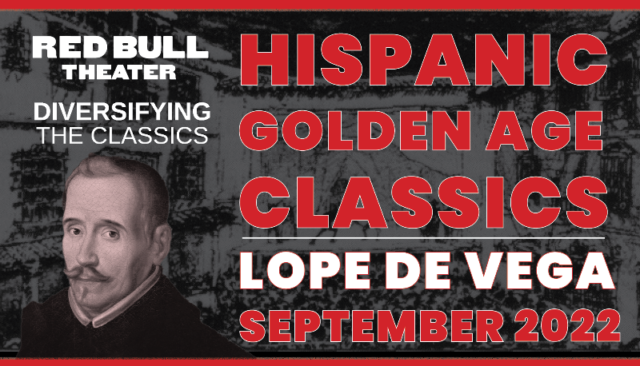
Who: Red Bull Theater
What: Online benefit reading and free discussions
Where: Red Bull Theater online
When: Monday, September 12, $25, 7:30
Why: Red Bull Theater kicked off its “Hispanic Golden Age Classics — Lope de Vega” initiative on September 8 with the panel discussion “Lope de Vega & Shakespeare,” exploring how the Bard and Spanish playwright and novelist Félix Lope de Vega y Carpio both wrote works about the Capulets and the Montagues; UCLA professor Barbara Fuchs and UCLA PhD candidate Rhonda Sharrah were joined by actor Dakin Matthews, who wrote the new rhyming translation that is being used. The “Diversifying the Classics” programming is centered by a live, online reading of Lope de Vega’s The Capulets and the Montagues (Castelvines y Monteses) on September 12 at 7:30 (available through September 18 at 11:59 pm), performed by Junior Nyong’o as Romeo and Cara Ricketts as Juliet, along with Anita Castillo-Halvorssen, Christian DeMarais, Carson Elrod, Topher Embrey, Alejandra Escalante, Jake Hart, Paco Lozano, Maria-Christina Oliveras, Timothy D. Stickney, and Matthews, directed by Melia Bensussen. On September 15 at 7:30, members of the creative team will participate in the interactive online Bull Session “The Capulets and the Montagues.”
“Castelvines y Monteses is the sixth comedia I have translated, and my first Lopean adventure — after three Alarcóns, one Tirso, and one Moreto. It was a bracing experience to dip for the first time into the font from which sprang all later comedias,” Matthews explains in an introductory essay. “And it was just as bracing to work with material that so closely accorded with that of Shakespeare, who has been the subject of my lifelong fascination and study. And there, of course, lies the first trap that I — and any translator who comes to Lope’s version of the Romeo and Juliet story — must try to avoid. (Which I did not make any easier on myself, I confess, by my determination to use the equivalent Shakespearean proper names in an effort to make the play more appealing to English-speaking producers and audiences.)” Meanwhile, Sharrah notes, “Miguel de Cervantes, [Lope’s] contemporary and rival, may not have meant it entirely as a compliment when he called Lope a ‘monster of nature’ (monstruo de la naturaleza). Yet Lope’s prodigious output was fundamental to developing the theater of his age, and to our understanding of it today. The monster of nature left us many gifts.”